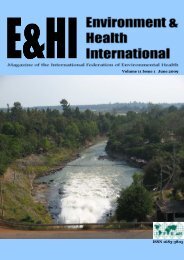IFEH ISSUE 6 - International Federation of Environmental Health
IFEH ISSUE 6 - International Federation of Environmental Health
IFEH ISSUE 6 - International Federation of Environmental Health
- No tags were found...
You also want an ePaper? Increase the reach of your titles
YUMPU automatically turns print PDFs into web optimized ePapers that Google loves.
national development programmes and projects, mobilise the resources needed to support and<br />
strengthen these activities, promote community-based local initiatives in the area <strong>of</strong> environmental<br />
health and coordinate interventions related to the management <strong>of</strong> environmental health activities<br />
(WHO 1998a).<br />
The Southern African Development Community (SADC) <strong>Health</strong> Protocol reaffirms the importance <strong>of</strong><br />
improving environmental health conditions <strong>of</strong> communities especially in rural and under-developed<br />
areas. The WHO has also committed itself to the <strong>Health</strong> for All in the 21st Century framework which<br />
makes explicit three goals (WHO 1998b): (i) an increase in life expectancy and improvement in the<br />
quality <strong>of</strong> life for all; (ii) improved equity in health between and within countries and (iii) access for<br />
all to sustainable health systems and services. While not encompassing all the actions, environmental<br />
health falls clearly in the interface between health and development and is therefore critical to the goal<br />
<strong>of</strong> “making health central to human development” (Thomas et. al., 2002; Cairncross et. al., 2003).<br />
Malawi is a country located in Southern Africa, east <strong>of</strong> Zambia and shares borders with Mozambique<br />
and Tanzania. The country is one <strong>of</strong> the poorest nations in the world. Two out <strong>of</strong> five people live on<br />
less than US$1 per day and three quarters <strong>of</strong> the population on less than US$2 per day. Within SADC,<br />
only Angola and Mozambique have a human development index value less than that <strong>of</strong> Malawi<br />
(Chunga et. al., 2004). It is categorized within the lowest human development category. Despite the<br />
financial challenges facing the country, the academic institutions in collaboration with the<br />
environmental health pr<strong>of</strong>ession are striving to produce graduates, at different levels, to improve the<br />
health <strong>of</strong> the nation. Here, we present the first <strong>of</strong> two papers on the challenges facing the pr<strong>of</strong>ession<br />
and academia reviewing the past, present and future <strong>of</strong> the pr<strong>of</strong>ession and academia in the country.<br />
THE PAST<br />
The environmental health pr<strong>of</strong>ession in Malawi dates back to the early 1950s when the Government <strong>of</strong><br />
Malawi established the Likangala School <strong>of</strong> Hygiene in Zomba. The school trained an <strong>Environmental</strong><br />
<strong>Health</strong> cadre popularly referred to as ‘Sanitary Capitaos’ (Sanitary Inspectors). At this time they were<br />
mostly engaged in nuisance inspection and control duties e.g. inspecting liquid and solid waste<br />
disposal facilities (Chunga et. al., 2004). Later in 1980 the course for this cadre was moved to a newly<br />
opened college called Lilongwe School <strong>of</strong> <strong>Health</strong> Sciences (LSHS) run by the Ministry <strong>of</strong> <strong>Health</strong>.<br />
LSHS <strong>of</strong>fered a two year certificate course and produced a cadre <strong>of</strong> graduates now known as <strong>Health</strong><br />
Assistants (HAs).<br />
Supporting the Sanitary Capitaos in the early days were the Public Vaccinators (PVs) whose role and<br />
responsibility was to vaccinate people against smallpox. These PAs travelled the length and breadth <strong>of</strong><br />
the country vaccinating people and were immensely successful and their mission. In 1972 Malawi<br />
together with other countries under World <strong>Health</strong> Organization auspice was declared smallpox free in<br />
1978 (Ntopi, 2010). In 1973 Malawi experienced its first cholera outbreak in Nsanje District and HAs<br />
and PVs played a pivotal role in stemming the outbreak by promoting village sanitation and water<br />
hygiene. As a result the PVs became entrusted by the Government as they had demonstrated that they<br />
had the necessary skills and knowledge base undertake the duties associated with preventing and<br />
controlling cholera outbreaks. As a result they were renamed Cholera Assistants. Today Cholera<br />
Assistants are known as <strong>Health</strong> Surveillance Assistants due to the increased nature <strong>of</strong> their duties.<br />
They now undertake a range <strong>of</strong> preventative and medical health activities at community (village) level<br />
and are located primarily at the community (village) level within health posts and report to the District<br />
16



